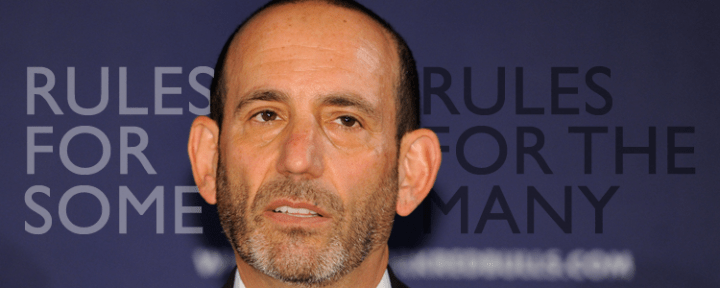
Sometimes, I like to imagine that time travel is a reality and that I’ve been given the opportunity to fast forward ten years into the future. Predictably, it can be fun to try to guess how much that world will differ from the one we currently live within. But, for me at least, it’s even more fun to try to envision how that world will look back upon today. How will they judge the events of our time, our reactions to them, and the decisions we made?
For example, take the current world of Major League Soccer.
This is a fascinating time for the burgeoning North American soccer league. Attendance, despite being a hair down from last year, is on a positive growth trajectory. New stadiums dot the league and more are on the way. The league is attracting new talent and holding on to their own good players longer. And expansion… how can we not talk about expansion? There’s been a massive influx of not just new clubs into the MLS, but successful ones at that. Two new teams will be joining in 2015, and another three are expected prior to 2020.
So the future is bright for the league, right? Most would agree that’s the case. And for the most part, I do too. But all those points aren’t necessarily enough to guarantee that we’ll look back in ten years time and judge this the “golden era” of Major League Soccer. Issues new and old persist in a number of areas.
TV ratings remain low and are a major focus for the league moving forward. MLS’s single-entity ownership structure often is credited for being limiting in nature on the mild side; on the extreme end single-entity provides ample room for certain sides to be shown favoritism. The league calendar still doesn’t fit the FIFA calendar, conflicting with major tournaments such as the World and Gold Cups. Chivas USA is a walking disaster. And perhaps surprisingly, expansion is of some concern as well.
Remember a few months ago when MLS commissioner Don Garber announced the league would be expanding to 24 teams by 2020? That announcement came hot on the heels of a spring declaration that Manchester City and the Yankees would be forking out a combined $100 million just for the rights to the long-rumored — and heavily debated — second New York City franchise. Which meant that, alongside the current 19 sides in the MLS, the league would need to establish a further 4 clubs in just six seasons’ time. Ambitious barely begins to cover it.
It’s natural to wonder if I might be blowing things out of proportion a bit here. That’s especially true given that MLS has been very clever with their expansion picks since the failures of Miami Fusion FC and Tampa Bay Mutiny. They’ve gone to markets with built-in fan bases like Seattle and Montreal. They’ve chosen cities that at least have their own stadium plans in place (Portland), or can provide a viable alternative in its place (Vancouver). And they’ve found owners willing to foot increasingly larger league entrance fees and financial commitments.
The first of these further four expansions planned by Garber and Co. — Orlando, who is due to be named the 21st MLS club tomorrow — seems to fit the mold perfectly. Orlando City SC is an organization with competent ownership, a recently approved stadium plan in place and an already rabid support. And the further three expansion slots, as the league already noted, should meet these same expectations.
However, the same can’t exactly be said of their predecessors, New York City FC.
NYCFC, by current count, is only meeting one of the three requirements. The Citizens and the Yankees are renowned for their business acumen and stability. So it’s fair to say they more than meet the “proper ownership” requirement. But stadium plans are still a long way away from being finalized, with Yankee Stadium currently slated to be their home when they kick off in 2015. And maybe even more damning, there’s no evident demand for the team to be there in the first place. So team 20 hardly appears to be checking off all the appropriate boxes.
And if the rumors prove to be true, club #22 seems likely to be headed to another location that doesn’t check any more than that either.
Multiple sources have reported that David Beckham — who had a clause in his MLS contract that allowed him a cut-rate ownership opportunity — and a posse of wealthy investors have settled upon Miami as their expansion city of choice.
If you’re feeling surprised by this news, you shouldn’t be. The likelihood of a fashion icon, model and global ambassador like Beckham choosing a home for his franchise in a soccer-crazy town in flyover country like St. Louis or San Antonio seemed slim to none. In truth, there are only so many cities in this country that provide Mr. and Mrs. Goldenballs with the adequate glam factor. New York would do, but NYC2 was already gobbled up. LA doesn’t need a third team, and nobody seems capable of prying Chivas USA from Jorge Vergara’s steely cold grasp. So aside from Miami, there really wasn’t anywhere else he’d be willing to go.

But the problems with selecting Miami are many. Team Beckham FC seems likely to use Florida International University Stadium as a temporary home. This means that a new MLS franchise would once again be forced to be secondary tenants on an artificial pitch built for gridiron football. Furthermore, no long-term replacement facility plans have come to light either. That’s not to mention the city’s track record with professional soccer: “spotty” seems an apt description. The Fusion only lasted four seasons before they were contracted, in large part due to poor attendance numbers and a lack of corporate sponsorships. Lower league Miami FC didn’t fare much better, as they picked up shop and moved on up the cost to become the Ft. Lauderdale Strikers after four seasons “in” Miami.
To me at least, that spawns a lot of questions. Why are Miami and NYCFC not having to meet the same qualifications that Orlando apparently had to? Will the league ignore these qualifications again when they look to choose teams 23 and 24, or will MLS just revert to following their own rules again when it best suits them? If NYCFC or Miami don’t meet expectations, will they get special favoritism again?
It stinks of yet another double standard in MLS operations. The league office has already been under attack, accused of playing favorites with the Dempsey’s “allocation” to Seattle. There’s also discontent around their soft treatment of big name stars whenever they find themselves in trouble. And since most of those big name stars play on bigger market teams like LA, New York and Seattle, that’s the possibility of even more preferential treatment.
I can understand the need to help the league attract bigger name players — and that generally only larger market teams can afford them. But developing a reputation for playing favorites is a great way to discourage future investors from investing in smaller market sides. And that’s something that the league desperately needs to thrive.
Will that be the case? I don’t know. But I worry that when we look back in ten years, these could be the issues that define Major League Soccer’s future plight. I’d love more than anything to believe that Garber and band of merry men share similar concerns, and that they’re only taking actions like this now to help the league grow and prosper in the future. They’ve navigated the tricky waters of professional sports in this country well to this point, so maybe I’m not giving them enough credit.
Hopefully though, we will look back on today in ten year’s time and call this time where MLS became the juggernaut we all hoped it would one day become. And if that’s the case, we’ll fondly look back on these double standards as necessary steps to reach those goals.

